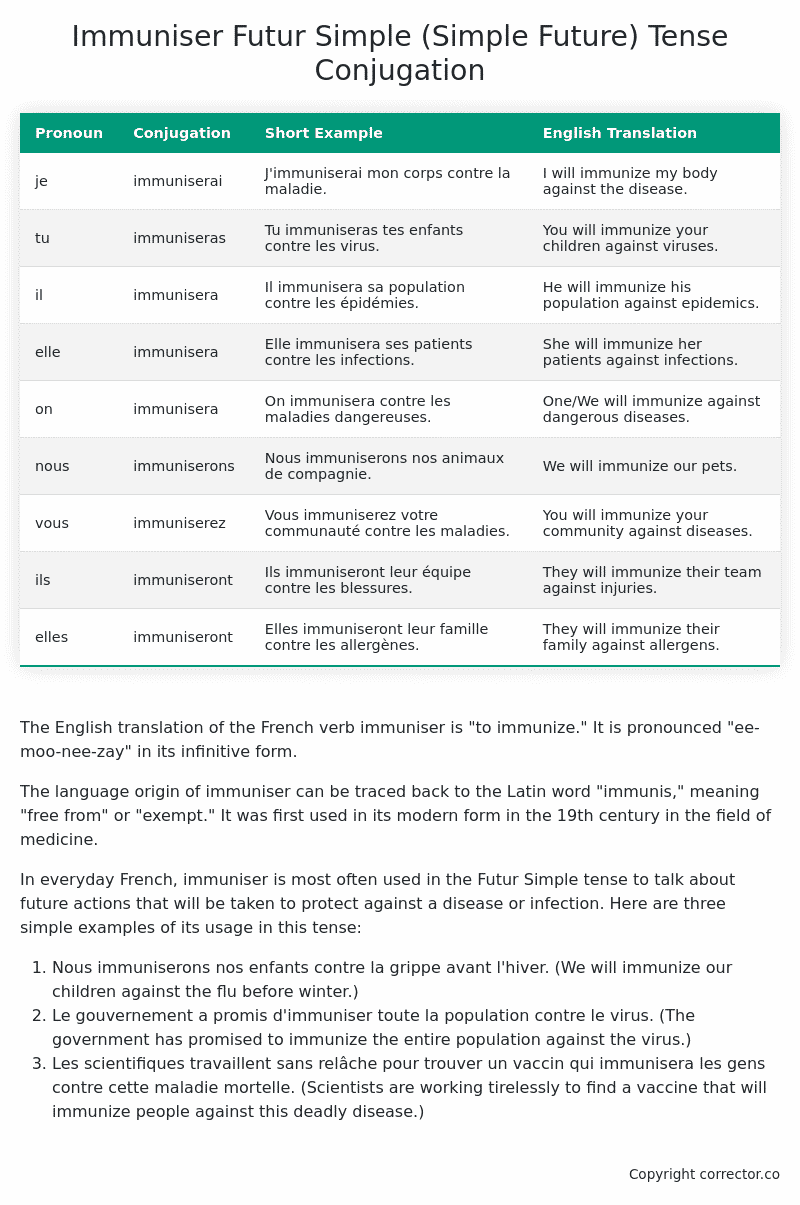Futur Simple (Simple Future) Tense Conjugation of the French Verb immuniser
Introduction to the verb immuniser
The English translation of the French verb immuniser is “to immunize.” It is pronounced “ee-moo-nee-zay” in its infinitive form.
The language origin of immuniser can be traced back to the Latin word “immunis,” meaning “free from” or “exempt.” It was first used in its modern form in the 19th century in the field of medicine.
In everyday French, immuniser is most often used in the Futur Simple tense to talk about future actions that will be taken to protect against a disease or infection. Here are three simple examples of its usage in this tense:
- Nous immuniserons nos enfants contre la grippe avant l’hiver. (We will immunize our children against the flu before winter.)
- Le gouvernement a promis d’immuniser toute la population contre le virus. (The government has promised to immunize the entire population against the virus.)
- Les scientifiques travaillent sans relâche pour trouver un vaccin qui immunisera les gens contre cette maladie mortelle. (Scientists are working tirelessly to find a vaccine that will immunize people against this deadly disease.)
Table of the Futur Simple (Simple Future) Tense Conjugation of immuniser
| Pronoun | Conjugation | Short Example | English Translation |
|---|---|---|---|
| je | immuniserai | J’immuniserai mon corps contre la maladie. | I will immunize my body against the disease. |
| tu | immuniseras | Tu immuniseras tes enfants contre les virus. | You will immunize your children against viruses. |
| il | immunisera | Il immunisera sa population contre les épidémies. | He will immunize his population against epidemics. |
| elle | immunisera | Elle immunisera ses patients contre les infections. | She will immunize her patients against infections. |
| on | immunisera | On immunisera contre les maladies dangereuses. | One/We will immunize against dangerous diseases. |
| nous | immuniserons | Nous immuniserons nos animaux de compagnie. | We will immunize our pets. |
| vous | immuniserez | Vous immuniserez votre communauté contre les maladies. | You will immunize your community against diseases. |
| ils | immuniseront | Ils immuniseront leur équipe contre les blessures. | They will immunize their team against injuries. |
| elles | immuniseront | Elles immuniseront leur famille contre les allergènes. | They will immunize their family against allergens. |
Other Conjugations for Immuniser.
Le Present (Present Tense) Conjugation of the French Verb immuniser
Imparfait (Imperfect) Tense Conjugation of the French Verb immuniser
Passé Simple (Simple Past) Tense Conjugation of the French Verb immuniser
Passé Composé (Present Perfect) Tense Conjugation of the French Verb immuniser
Futur Simple (Simple Future) Tense Conjugation of the French Verb immuniser (this article)
Futur Proche (Near Future) Tense Conjugation of the French Verb immuniser
Plus-que-parfait (Pluperfect) Tense Conjugation of the French Verb immuniser
Passé Antérieur (Past Anterior) Tense Conjugation of the French Verb immuniser
Futur Antérieur (Future Anterior) Tense Conjugation of the French Verb immuniser
Subjonctif Présent (Subjunctive Present) Tense Conjugation of the French Verb immuniser
Subjonctif Passé (Subjunctive Past) Tense Conjugation of the French Verb immuniser
Subjonctif Imparfait (Subjunctive Imperfect) Tense Conjugation of the French Verb immuniser
Subjonctif Plus-que-parfait (Subjunctive Pluperfect) Tense Conjugation of the French Verb immuniser
Conditionnel Présent (Conditional Present) Tense Conjugation of the French Verb immuniser
Conditionnel Passé (Conditional Past) Tense Conjugation of the French Verb immuniser
L’impératif Présent (Imperative Present) Tense Conjugation of the French Verb immuniser
L’infinitif Présent (Infinitive Present) Tense Conjugation of the French Verb immuniser
Struggling with French verbs or the language in general? Why not use our free French Grammar Checker – no registration required!
Get a FREE Download Study Sheet of this Conjugation 🔥
Simply right click the image below, click “save image” and get your free reference for the immuniser Futur Simple tense conjugation!

Immuniser – About the French Futur Simple (Simple Future) Tense
Formation of Futur Simple
For regular -er verbs (e.g., parler – to speak)
For regular -ir verbs (e.g., finir – to finish)
For regular -re verbs (e.g., vendre – to sell)
Common Everyday Usage Patterns
Conditional Statements
Interactions with Other Tenses
Futur Antérieur
Conditional
Present
Summary
I hope you enjoyed this article on the verb immuniser. Still in a learning mood? Check out another TOTALLY random French verb conjugation!


